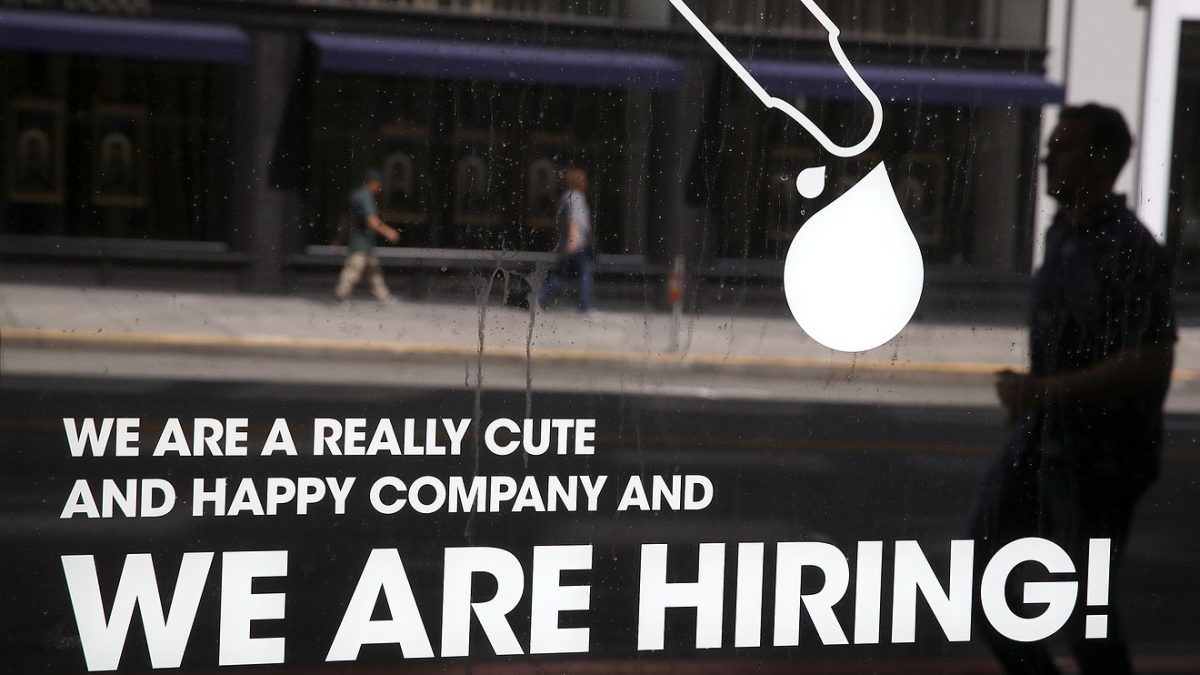U.S. Labor Department data show 20.5 million out work, unemployment rate hits 14.7%

Published: May 8, 2020 at 4:24 p.m. ET, By Chris Matthews and Mark DeCambre
U.S. stocks ended Friday’s session sharply higher despite Labor Department data showing 20.5 million jobs were lost in April, with the unemployment rate rising to 14.7%, underscoring the depth of the impact of the COVID-19 pandemic on the American economy.
How did the benchmarks fare?
The Dow Jones Industrial Average DJIA rose 455.43 points, or 1.9%, to close at 24,331.32 and the S&P 500 index SPX gained 48.61 points, or 1.7% to end the session at 2,929.80. The Nasdaq Composite Index COMP advanced 141.66 points, or 1.6%, to 9,121.32
For the week, the Dow advanced 2.6%, the S&P 500 ended 3.5% higher, while the Nasdaq advanced 6%.
What drove the market?
Equity markets powered through a gantlet of grim economic data points on jobs to close Friday out with the best weekly gain in about a month.
The monthly report on the employment situation in the U.S. showed that 20.5 million jobs were eliminated last month, and the unemployment rate rocketed 14.7% from a 50-year low of only 3.5% two months ago and 4.4% last month. However, the headline number was better than some estimates for 22 million newly unemployed.
See: Coronavirus costs the U.S. 20.5 million jobs in April, unemployment soars to 14.7%
The report comes after Thursday’s weekly jobless claims data revealed that those looking for unemployment benefits increased another 3.2 million in early May — and even more if newly eligible workers who applied through a federal program are counted.
A broader measure of unemployment that includes discouraged job seekers and other people on the fringes of the labor market skyrocketed to a record 22.8%.
Although the government didn’t keep records back then, economic historians estimate unemployment peaked at 25% in 1933.
“Unfortunately, the magnitude of job losses is something that cannot be contained and total jobs lost – and potentially the unemployment rate – are likely to meet or exceed the infamous statistics from the Great Depression,” wrote Chris Zaccarelli, chief investment officer at Independent Advisor Alliance, in emailed comments.
So far, the equities market has discounted the economic weakness amid progress toward the reopening of seized-up economies in the U.S. and abroad, as restrictions imposed to limit the spread of the deadly pathogen are loosened gradually.
“While this pandemic has the potential to create economic conditions that are as bad or worse than the Great Depression, the steps that the Federal Reserve Bank has already taken, coupled with the stimulus that Washington is also providing, are the main reasons why we are unlikely to re-experience that terrible time in world history”, Zaccarelli said.
Another reason analysts have pointed to for why investors are shrugging off the brutal jobs report is that 18 million of the 20.5 millions jobs lost were classified by employers as “temporary.”
“What markets are trying to price in is how fast we can get back to normal,” said Shawn Cruz manager of trading strategy at TD Ameritrade. Such a high fraction of job losses being classified as temporary “gives confidence that the majority of those people will be rehired fairly quickly.”
Market sentiment was also helped by news that the U.S. Trade Negotiator Robert Lighthizer and his Chinese counterpart Liu He and U.S. Treasury Secretary Steven Mnuchin held a phone call on Thursday, which resulted in the two largest economies in the world agreeing to strengthen macroeconomic and public-health cooperation.
The report signifies a softening of hostilities between Washington and Beijing after President Donald Trump accused China of mishandling the coronavirus outbreak and threatened to quash a bilateral trade pact between the nations.
Trump has said he would impose more tariffs on Chinese goods as punishment for what he says is misleading the world about the novel strain of coronavirus which was first identified in Wuhan, China, in December.
In a Fox News interview Friday morning, Trump said he’s having “a very hard time with China” and hasn’t decided how to handle the trade relationship.
Investors have kept one eye on trade talks with China and the other on the state of the economy in the aftermath of the pandemic.
Which stocks were in focus?
– Dropbox Inc. DBX notched its first quarterly profit since its debut as a publicly traded company in 2018, though shares were lower Friday afternoon. Shares closed 0.1% lower.
– Uber Technologies UBER reported first-quarter results that revealed weakness in its ride-hailing business but a surge in its food-delivery segment. The company’s stock ended the session 6% higher.
– J.C. Penney Co. Inc. US:JCP fell 9.6% after it and Sephora reaffirmed their partnership late Thursday, ending a spat after the cosmetics company threatened to pull out of J.C. Penney stores.
– Stamps.com Inc. STMP shares fell 4.1% after the company reported earnings and revenue that topped consensus estimates.
– Shares of Herbalife Nutrition Ltd. HLF ended the session 11.5% higher after the nutritional supplements company beat Wall Street expectations for its first quarter.
– Shopify Inc. shares SHOP retreated 1.9% on Friday after the Canadian e-commerce software company said it would sell shares after its stock roared to record highs this week.
– Booking Holdings Inc. BKNG closed 0.9% lower after the online travel site’s quarterly earnings fell short of Wall Street estimates as the travel industry was hit hard by the COVID-19 pandemic.
– Guggenheim analyst Jeff Cantwell downgraded shares of Square Inc. SQ to.neutral from buy on Friday, writing that he expects the small- and medium-size businesses who use Square’s platform to experience a tough stretch in the second half of 2020 and throughout 2021. The payments firm’s stock gained 1.9% on the day.